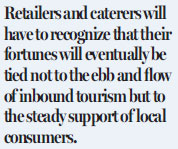HK shoppers to regain prime spots as rents fall
Updated: 2017-05-22 07:43
By Peter Liang(HK Edition)
|
|||||||
Peter Liang notes hard times for luxury retailers and landlords, as tourist numbers shrink, have little fallout for broader economy
Business leaders and some economists have blamed the prolonged downturn in retail sales on the fall in the number of tourists, especially those from the Chinese mainland.
To them, the solution looks simple. All the government needs to do to reverse the trend is to spend more public funds on promoting tourism by building new attractions and upgrading existing ones.
Latest official figures show that the seasonally adjusted retail sales in the first quarter of this year fell 2.3 percent by value and 2.2 percent by volume from the year-earlier period. Analysts predict the down-trend in retail sales will continue in the second quarter and beyond.
Should we be worried about it? The simple answer is yes, because the retail sector - together with catering and related logistics activities - is one of the largest employers in Hong Kong. Despite its relatively small, about 4 percent, contribution to the economy, the retail industry employs more than 350,000 people - or 10 percent of the entire workforce.

The retail industry boom in the past was largely attributed to the flood of visitors, mainly from the mainland, since 2003. But even at the peak of the boom in 2009 tourism expenditure contributed less than 30 percent of the retail industry's value added, according to government data.
To the average Hong Kong consumer, the tourism-generated retail boom came with a heavy cost. Shops selling high-profit-margin luxury merchandises to free-spending tourists have driven many outlets favored by local shoppers away from all the major commercial districts - including Causeway Bay on Hong Kong Island, and Mong Kok and Tsim Sha Tsui in Kowloon.
The resulting surge in shop rentals in those districts has rapidly eroded Hong Kong's competitiveness against other tourism destinations. More and more mainland shoppers are finding it cheaper to buy the luxury goods they covet in Tokyo, London or Paris.
What's more the major online stores - including Taobao and Amazon - offer mainland consumers the convenience of shopping online from a long list of manufacturers and vendors around the world. The decline in Hong Kong retail sales is inevitable and cannot be reversed by building attractions to lure tourists.
Closures of the outlets of some foreign luxury brands made headline news. There have been numerous reports of landlords cutting rents of prime commercial spaces to lure new tenants.
But their demise is having little economic or social consequence. The much-dreaded layoffs in the retail sector have not materialized. In fact, the booming catering sector is experiencing an acute shortage of labor, resulting in a surge in average wages for even unskilled menial jobs, such as dish-washing.
The people who get hit the hardest by the decline in tourism spending are landlords of commercial properties, vendors of foreign luxury goods and owners of the many pharmaceutical stores that sell herbal remedies and dried seafood mainly to mainland visitors. There is little reason for the government to even consider spending public funds for the benefit of those who are capable and willing to take commercial risks.
So far, lower rentals have not led to reduced prices of goods and services because business owners are reluctant to trim the high profit margins they have grown used to for so long catering to tourists. But in the longer-term, more and more Hong Kong consumers will reject the idea that getting fleeced is the price they have to pay for the privilege of shopping and entertaining in the hottest commercial strips in town.
Retailers and caterers will have to recognize that their fortunes will eventually be tied not to the ebb and flow of inbound tourism but to the steady support of local consumers. To win the loyalty of local patrons, retailers will have to accept the reality of lower profit margins and prepare to offer reliable services.
The retail boom driven by the surge in tourism spending is a thing of the past. Only a few who have benefited from it will miss it. The rest of us are looking forward to the return of normal times when we could get value for money at our favorite shops and restaurants wherever we choose to go.
The author is a veteran current affairs commentator.
(HK Edition 05/22/2017 page8)